The X Button
Dive For You
by Todd Ciolek,

A new Mortal Kombat game is almost upon us, and it's courting old fans by re-imagining the first three games in the series. This gives me the opportunity to talk about BloodStorm, which all of you should be playing instead of any Mortal Kombat update. After all, BloodStorm has scores of secrets, a dynamic move-learning system, and violence much more ridiculously extreme than Mortal Kombat. Even Daniel Pesina likes BloodStorm better, and he was Johnny Cage in Mortal Kombat.
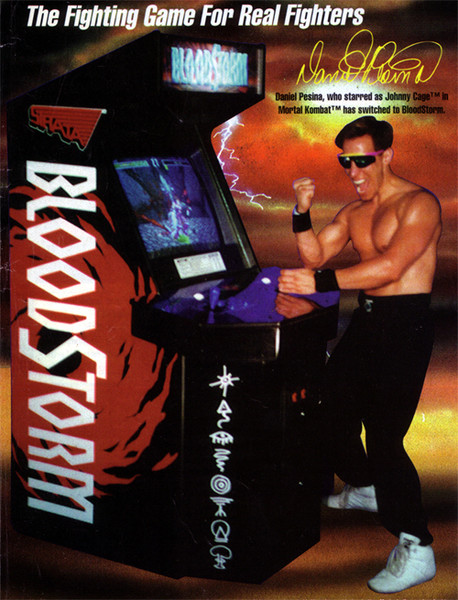
No, that's a lie. BloodStorm is just an awful Mortal Kombat rip-off from 1994, and it vanished from arcades by 1995. In fact, the game's most notable contribution was in getting Pesina dismissed from future Mortal Kombat games, as Midway was reportedly none too pleased with the ad above. It even adds some insult to the injury: judging by the screen and the joystick that Pesina's holding, he actually lost.
NEWS
ACE ATTORNEY INVESTIGATIONS 2 NOT COMING HERE...
There was always something particularly amusing about the Ace Attorney series succeeding in North America. The original Phoenix Wright's Japanese debut inspired some to complain that CAPCOM would never, ever take a chance on localizing a game about lawyers. Yet CAPCOM shocked those people by releasing the series here as Phoenix Wright, and Phoenix Wright shocked even more people by actually selling.
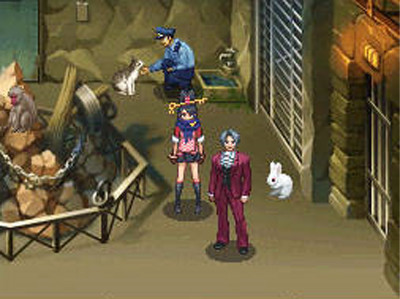
Well, it sold well for a niche game, at least. A niche success only goes so far, and it didn't go far enough with Ace Attorney - Investigations, a spin-off adventure game starring Phoenix's rival Miles Edgeworth. A sequel to Investigations arrived in Japan this past February, but CAPCOM reps recently commented that there's no plan to localize it at the moment. The “at the moment” part is key, as it's still possible that CAPCOM will release an English version. Still, we won't see Ace Attorney - Investigations 2 any time soon. The same goes for the upcoming Professor Layton and Phoenix Wright crossover, which remains exclusive to Japan.
...BUT SUPER STREET FIGHTER IV ARCADE EDITION IS
Super Street Fighter IV: Arcade Edition posed a problem for CAPCOM. The game's a relatively minimal upgrade of Super Street Fighter IV, with four new characters and some gameplay tweaks, but it's very much something that fans of the series want to play. Should CAPCOM release it as a stand-alone disc, dipping into the Street Fighter IV well for a third time? Or should they just make Arcade Edition a downloadable upgrade for owners of Super Street Fighter IV?
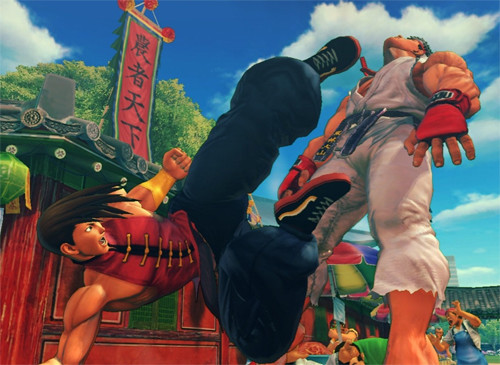
The answer: Yes and yes. CAPCOM's releasing Arcade Edition as both a download and a stand-alone title. On June 7, anyone who owns Super Street Fighter IV can pay $14.99 (or 1200 Microsoft points) and download Arcade Edition's extra content; that'd be Yun and Yang (above) from Street Fighter III, plus Evil Ryu, Oni Akuma, and some new features for the Replay Channel. For the decidedly insane fans and those who don't yet own any form of Street Fighter IV, there'll be a disc version of Arcade Edition available on June 24 for $39.99. That takes care of Xbox 360 and PlayStation 3 owners, and CAPCOM has a PC version of Arcade Edition scheduled for July.
WHITE KNIGHT CHRONICLES 2 ANNOUNCED FOR U.S.
For all of its high-budget gloss and Sony-backed presence on the PlayStation 3, White Knight Chronicles made fairly small waves when it arrived in the U.S. last year. That didn't stop Sony from greenlighting a sequel, and developer Level-5 seems intent on drawing in new fans: White Knight Chronicles II includes the first game in its entirety. It's also getting another chance at North America: D3 Publisher will release it here this summer.
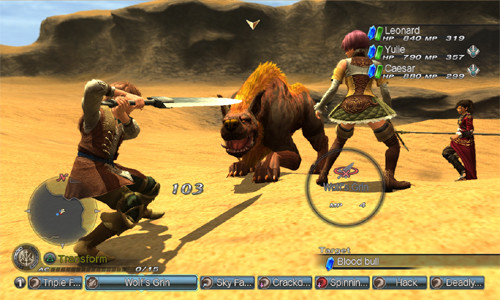
Rebelling against the RPG trend of sequel set 1,000 years later or in completely unrelated worlds, White Knight Chronicles II starts directly after the events of the first, with hero Leonard struggling against the insidious Magi organization and trying to decide between his childhood friend Yulie and the princess Cisna. No, this isn't breaking new ground in RPG storytelling, but White Knight Chronicles II is still ambitious in the size of everything. Leonard can change into the towering White Knight, and the game's world includes some of the largest enemies in an RPG. Battles are paced in real-time, with AI-controlled characters following a leader, and players can even customize a new ally to join Leonard in battle. It's like self-insertion fan fiction come to life.
GUILTY GEAR XX ACCENT CORE MAKES IT TO EUROPE
Guilty Gear XX Accent Core Plus isn't news here in the U.S., where we've had home versions of the game since 2009. Yet the game hasn't yet made its way to Europe, even though the continent's enjoyed some semi-obscure Japanese games denied to Americans. Zen United is making amends the only way a publisher can: with an extensive European collector's edition set to ship on May 6.
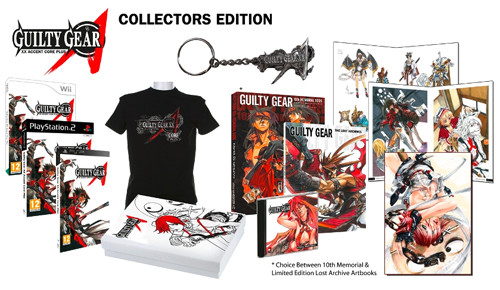
The package includes a Guilty Gear T-shirt, a keychain, a numbered art print that shows key-wielding artificial warrior A.B.A., an Accent Core Plus soundtrack, and the buyer's choice of either the Guilty Gear 10th Memorial artbook released in 2009 or the exclusive Guilty Gear: Lost Archives artbook. Oh, and a nice box to hold it all. The set's available for the Wii, PlayStation 2, and PSP versions of the game, and it's priced at just under 67 pounds. That's about $107. I imagine most American fans of the series will pass, though I'm curious about that Lost Archives book.
IN BRIEF: YAKUZA BACK ON TRACK, BANGAI-O HD COMING IN MAY, NINTENDO NABS SOLATOROBO, BIO FORCE APE REVEALED
Sega's Yakuza: Of the End hit a delay after the earthquake, slipping from its March 18 release to an unspecified date. Sega recovered, however, and scheduled a June 9 date for this zombie-filled entry in their heretofore semi-realistic Yakuza series. Sega also plans to donate a percentage of the game's sales to the Japan Red Cross.
Treasure's Bangai-O HD: Missile Fury went through a delay of its own last year, but D3 Publisher revived it with a new May 4 release date. Following the original Bangai-O and the DS-based Bangai-O Spirits, Missile Fury brings the tiny-sprite robots and copious explosions of the series to a high-definition Xbox Live game, featuring many puzzle-like stages full of missile barrages, power-up fruits, and all sorts of robot-wielded weapons. There's also a level editor, and players can share creations without the odd sound-storing methods of Bangai-O Spirits.
Now that the PSP remake of Tactics Ogre is out, I need a new game to follow down to the smallest news story. I think it'll be Solatorobo, CyberConnect2's DS-based adventure game about steam-tech robots and floating islands and reverse-weredog warriors. Still unreleased in North America, it's headed to Europe on July 1 as Solatorobo: Red the Hunter. Nintendo itself is getting behind it, taking over the advertising and distribution of the game's European version. This wouldn't be the first time Nintendo of Europe scooped its American branch: Freshly Picked Tingle's Rosy Rupeeland and Last Window saw European releases without coming to North America.
I hesitated to mention Bio Force Ape last week. As a once-lost NES game recovered and released online, it lands in the not-quite-legal country of emulators and ROMs. But this is a special case, for Bio Force Ape was never actually released. Seta canceled it in 1991, despite earning favorable palaver from Nintendo Power and other magazines. Now the game's there for everyone to play, thanks to Lost Levels, and you can read the whole story here. And if you also download the game…well, I don't think Seta's going to complain. They shut down in 2009.
REVIEW: MOON DIVER
 Developer: FeelPlus
Developer: FeelPlus
Publisher: Square Enix
Platform: PlayStation Network (Xbox Live TBA)
Players: 1-4
MSRP: $14.99
A legacy isn't always kind to games. Moon Diver, for example, would be a much easier game to enjoy if it weren't tied to Strider, that classic arcade side-scroller where super-powered ninja fight in zero gravity and an entire Russian parliament transforms into an enormous cyborg centipede. Many have painted Moon Diver as a modern Strider, as the two games share designer Kouichi Yotsui as well as the idea of sleek, ninja-like heroes battling a bizarre villain's world-dominating army. But Moon Diver is its own game. More importantly, it's a tribute to the ideals of shockingly difficult action games.
Moon Diver expands on the basics of those old-school action games, of course. There's an initial array of four playable characters: Seyfert is the stable leader (he's red, after all), Hitori has the longest special-attack meter, Tolby is well-balanced, and the hammer-wielding Ourion hits hardest. There's a fifth Moon Diver named Silence lurking in the game's artwork, but he's likely a downloadable extra saved for later. So far, he only appears as a recurring sub-boss as the other four heroes slash their way through the forces of Faust, a strangely dressed demon overlord. It's hard to call Moon Diver's progression a proper story, as each stage brings up a short, Strider-like interlude where the heroes trade a few lines and Faust drops bizarre revelations about how he came from the sea to destroy the planet.

The Moon Divers are amply prepared from the start: each of them can double-jump, slide even in mid-air, dive-attack from above, hang or crawl overhand from platforms, and charge up a nastily powerful strike. There's also an arsenal of special moves to uncover, and most are strewn throughout the stages as yellow orbs. The powers granted by them are diverse: freeze enemies briefly, amp up attacks for a short while, hit every foe on-screen, or just fire useful projectiles. It's all a complex setup, and it's carried off with exceptionally fluid play mechanics. Moon Diver makes it quite easy to glide through stages, cutting down scores of Faust's minions and drifting through the air. Still, the control demands some odd lessons: crouching is accomplished by holding a shoulder button, and characters are moved with the left analog stick instead of the directional pad. And there doesn't seem to be an option to change any of that. Nor is there the chance to switch characters in between levels.
Moon Diver seems disappointingly bland at first glance—for the first four stages, in fact. The game drops the player in the desolated ruins of Barcelona, launching them into battle with Faust's ground troops. While they're nice to look at, the shattered city backdrops and hills of rubble get a bit repetitive after four levels, as do the streams of none-too-bright enemy soldiers, stationary cannons, and flying mecha-bugs. Fortunately, that's all just an overlong introduction to the game. By the fifth episode, it shifts to a battleship raid in the middle of the ocean, and everything improves across the board. The level design sharpens, the enemies get more diverse, and there are more chances to use your special abilities.
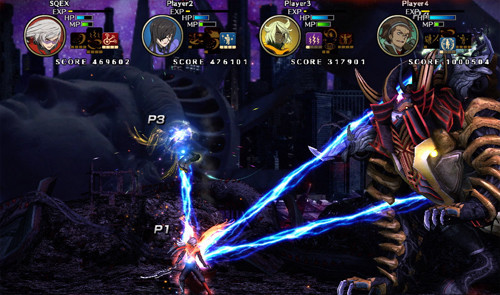
If Moon Diver gets better after the opening act, it sure doesn't get easier. Yotsui once remarked that he doesn't want players to escape from Moon Diver with their lives, and his creation spares little in challenging the player. After steadily introducing new concepts in the first four levels, Moon Diver throws everything at them; yellow robo-sentries explode into massive four-point starbursts, lasers sweep the screen, and tiny satellites snipe at any player foolish enough to stand still. The game's forgiving in small doses, though. Health refills and attack-meter energizers are fairly common, and falling into a pit usually deals only small damage. However, you have only one life bar, and when it's over, you're back to the beginning of the level. Moon Diver, like Hard Corps: Uprising, is made for the dedicated, for the potentially obsessive types who don't mind playing and replaying a stage until they've finally figured out the right strategy to make it past that web of lasers.
Moon Diver can't dodge comparisons to Yotsui's work on Strider and its considerably more surreal follow-up, Osman/Cannon Dancer. While Moon Diver has some rather crafty stages, it often seems padded and repetitive compared to his past designs. Strider, Cannon Dancer, and even the disappointing, Yotsui-less Strider 2 make a point of constantly throwing bosses and new enemies at the player: Strider's second stage alone features a battle with a Giant Robo-gorilla, a duel with an airborne assassin, a race down a mine-covered hillside, and a hovercraft-hopping trip on an airship to fight a trio of Chinese gymnast-assassins. Moon Diver doesn't have that variety, and its assortments of lumbering foot soldiers, distinguished by color and ability, are a little tiresome even when the game finds new ways to use them. The levels also tend to use swathes of enemies in place of actual mid-bosses, blocking off the screen so players can fight a stream of wasps and giant spiders instead of, say, a huge robot dinosaur. At least there's a trade-off: Moon Diver's a lot longer than the typical action game of Strider's day.
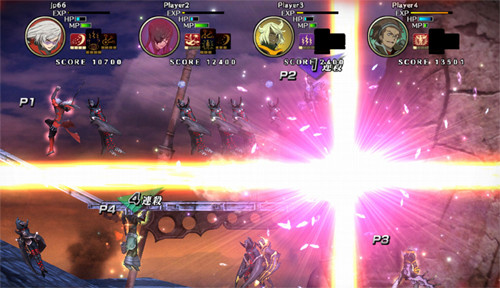
Moon Diver also has an excellent multiplayer mode to keep it afloat. Four players can join in at once, uniting to perform massive special attacks and rescue each other from sudden death. It's all quite chaotic, and it demands that the players involved know what they're doing. It's one of the game's best points, and the single-player mode can seem spare after a session of four players rushing through levels in a flurry of sword swipes and tethered lightning combo-attacks. And it helps that Moon Diver is a pretty game, with glossy effects and thumping beats making up for occasionally empty backgrounds.
A few strange design choices bring Moon Diver down, and it often lacks the variety and impact of a first-rate action title. But it still comes out ahead: the high-speed, hyper-flashy style puts it well above the ordinary, and its four-player attraction elevates it further. It's not the be-all, end-all masterpiece that some Strider fans might want, but there's plenty of challenging, maddening pleasure in Moon Diver.
NEXT WEEK'S RELEASES
ARCANA HEART 3 Arcana Heart 3 will certainly be overshadowed by the new Mortal Kombat, but Examu and Aksys probably don't mind all that much. They know that the Arcana Heart series draws from its own niche audiences: anime fans who adore cutesy female characters and fighting enthusiasts who don't mind controlling cutesy female characters amid complex martial-arts mechanics. Arcana Heart 3 presents players with a lot of options: there are 23 fighters in the game, and they can equip one of 23 arcana arts, gaining different moves and priorities with each art. The gameplay also emphasizes aerial moves more than the typical fighting cavalcade, and a Homing Dash maneuver makes close-range combos easier. The game's lineup introduces three new fighters: rich-girl Weiss, supernatural artist Eko, and the chain-summoning Scharlachrot join the previous games' roster of chipper schoolgirls, buxom Chinese androids, and characters with names like “Lieselotte Achenbach” and “Lilica Felchenerow.” Arcana Heart 3 plays up the cast in new ways: the playfield is bordered by animated portraits of the two fighters, and they react to the combat at hand. It's likely to find some audience here, however small. It'd be larger if Aksys Games released both the PlayStation 3 and Xbox 360 versions of the game, but it's only on the PSN for now. |
FINAL FANTASY IV: THE COMPLETE COLLECTION Final Fantasy VII may be the most popular game in its voluminous franchise, but where does Square Enix go when they need a quick remake? The older Final Fantasies, that's where. Take Final Fantasy IV, for example. In the twenty years since its Super NES debut, the game's visited the PlayStation, the Wonderswan, the Game Boy Advance, various mobile phones, and the DS. Now it's on the PSP as Final Fantasy IV: The Complete Collection. It includes the original game, with its solid RPG battle system and well-paced story of a disgraced knight's redemption. While it doesn't dig as deep as later Final Fantasies, it's an enjoyable game that set many standards for the series: melodramatic tones, hard-but-fair battles, and more than a few twists that echo Star Wars. This collection also packs in the possibly unnecessary cell-phone/WiiWare sequel The After Years and a new gap-bridging chapter, Final Fantasy Interlude. Both Final Fantasy IV and The After Years show off a new look: they're still old-fashioned RPGs, but the character sprites are now larger and a little more thorough in their animation. The collection's version of Final Fantasy IV lacks a lot of the features from the DS remake, though it has the post-game dungeons and party-customizing found in the Game Boy Advance version. If it's a shameless re-packaging of a game that was good enough on its own, this Complete Collection is at least more economical than buying The After Years One Piece at a time on WiiWare. It's not a bad package for Final Fantasy IV enthusiasts, even if they'll probably be buying some form of the game all over again on the 3DS. |
MORTAL KOMBAT This is technically the ninth Mortal Kombat, but you won't see a number in that title. That's because this latest installment is a retelling of the first three games. Sort of. It involves thunder-god Raiden, on the brink of death, sending a telepathic message to his younger self, who then changes the past and…uh...Look, the whole point of this is that all of the characters from Mortal Kombat 1 through 3 are included in a new fighting game. Like Street Fighter IV, it's a 2-D fighter with 3-D effects, allowing for detailed character models and opportune shifts in the player's viewpoint. The gameplay now uses four attack buttons that each correspond to a different limb (which was totally BloodStorm's idea), and the developers promise a fighting engine deeper than the uppercut contests that occupied us all in the Kombat-crazed days of 1994. The lineup's admittedly large, with Liu Kang, Johnny Cage, Scorpion, Sub-Zero, Sonya, Kano, Reptile, Kun Lao, Sindel, Ermac, Kitana, Jade, Mileena, Nightwolf, Cyrax, Smoke, Sektor, Jax, Stryker, Shang Tsung, Baraka, Kabal, Raiden, Sheeva, cyborg Sub-Zero, Quan Chi, pointless in-joke Noob Saibot, and a few hinted-at bonus fighters. PlayStation 3 owners can also get Kratos from God of War, who's apparently the closest thing Sony has to a mascot nowadays. And yes, this Mortal Kombat still has scads of gruesome fatalities. So many, in fact, that the game's banned in Australia. |
PORTAL 2 The original Portal was a wonderful, inventive creation that was sadly overexposed by fans, who turned mildly amusing Portal fixtures like the Companion Cube into insufferable memes. But Portal's still a good game, no matter how many people joke about the cake being, in fact, a lie. And there's reason to expect Portal 2 to be just as impressive. It uses the same gimmick as the original, with largely unheard heroine Chell wielding a Handheld Portal Device that creates little gateways on various surfaces. They're used for everything from shortcuts to inertial jumps, and it was remarkably fun just to screw around with them in Portal. The sequel returns Chell to the dubious care of sinister, perky-voiced supercomputer GLaDOS, expanding just about everything: the game's much longer, there are actual supporting characters, and the GLaDOS-run laboratory features all sorts of new devices. Even more divergent is the co-op-mode, with its separate storyline and two playable robot avatars named Atlas and P-body. Players use split-screen modes and color-coded portals to survive various puzzles, and Valve's aiming for cross-platform play between the PC and PlayStation 3 (Xbox 360 owners are left to play with each other). This is to say nothing of the game's sly, corporate-speak humor, which is certain to be parroted and leached of all comedy by the Internet within a week of Portal 2's street date. |
discuss this in the forum (29 posts) |
this article has been modified since it was originally posted; see change history
 Developer: Examu/
Developer: Examu/ Developer: Square Enix
Developer: Square Enix Developer:
Developer: 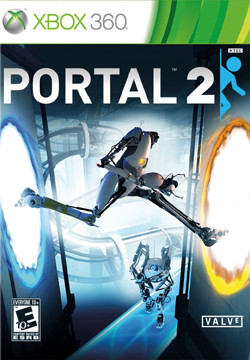 Developer: Valve
Developer: Valve